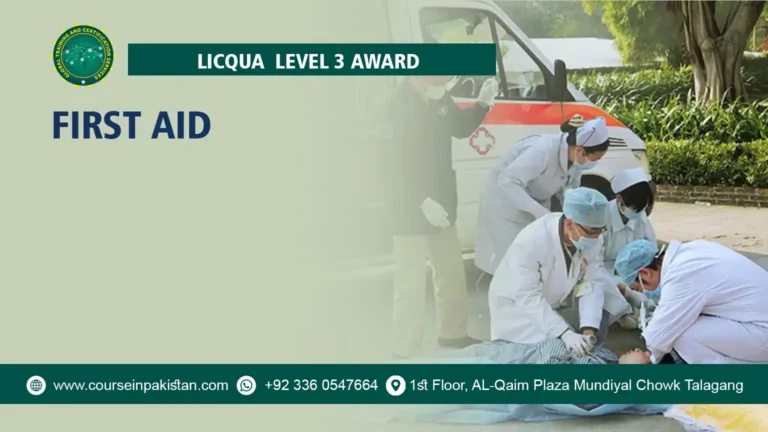
ICTQual Level 2 Award in Health and Social Care
In the dynamic field of health and social care, the Level 2 Award serves as a pivotal qualification for individuals aiming to deepen their understanding and skills in providing quality care.
Course Introduction
The Level 2 Award in Health and Social Care builds upon the foundational knowledge gained in Level 1, delving deeper into essential principles and practices required in health and social care settings. It prepares participants to handle more complex care scenarios and enhances their competence in delivering person-centered care.
Course Overview
This course covers a wide array of critical aspects within health and social care:
- Advanced Communication Skills: Developing effective communication techniques to engage with clients, families, and multidisciplinary teams.
- Safeguarding and Protection: Understanding safeguarding procedures and legal responsibilities to protect vulnerable individuals from abuse or harm.
- Health Promotion: Promoting well-being through education and support in areas such as nutrition, exercise, and mental health.
- Dementia Care: Recognizing the challenges faced by individuals with dementia and implementing appropriate care strategies.
- Person-Centered Planning: Collaborating with clients to develop personalized care plans that respect their preferences and choices.
Course Benefits
- Enhanced Career Prospects: Opens doors to a wider range of job opportunities in healthcare settings, including care homes, hospitals, and community services.
- Specialized Knowledge: Provides specialized knowledge in areas such as dementia care, mental health support, and disability care.
- Skills Development: Enhances practical skills in administering medication, supporting personal care needs, and responding to emergencies.
- Professional Recognition: Demonstrates competence and dedication to prospective employers or clients seeking reliable care services.
Course Study Units
The Level 2 Award in Health and Social Care typically includes study units such as:
Learning Outcomes
Communication in Health and Social Care
- Learning Outcomes:
- Demonstrate effective verbal and non-verbal communication skills when interacting with clients, colleagues, and families.
- Use communication techniques to build rapport, convey empathy, and establish trust in health and social care settings.
- Adapt communication styles to meet the diverse needs of individuals and ensure clear understanding in care interactions.
Understanding Mental Health and Well-being
- Learning Outcomes:
- Identify common mental health conditions and their impact on individuals’ well-being.
- Demonstrate empathy and sensitivity in supporting individuals experiencing mental health challenges.
- Apply strategies to promote positive mental health and well-being among clients in health and social care settings.
Safeguarding and Protection in Care Settings
- Learning Outcomes:
- Recognize signs and symptoms of abuse, neglect, and exploitation in vulnerable individuals.
- Implement safeguarding policies and procedures to protect clients from harm or mistreatment.
- Respond appropriately to safeguarding concerns, ensuring the safety and well-being of those under care.
Person-Centered Approaches in Health and Social Care
- Learning Outcomes:
- Adopt a holistic and individualized approach to care planning and delivery.
- Involve clients in decision-making processes and respect their preferences, values, and cultural backgrounds.
- Foster independence, autonomy, and dignity through person-centered care practices.
Health and Safety in Health and Social Care Settings
- Learning Outcomes:
- Identify potential health and safety hazards in health and social care environments.
- Implement measures to prevent accidents, injuries, and infections among clients and staff.
- Ensure compliance with health and safety regulations and promote a safe working environment.
Promoting Equality and Inclusion in Health and Social Care
- Learning Outcomes:
- Recognize and challenge discrimination, stigma, and barriers to equality in health and social care settings.
- Promote inclusive practices that respect diversity, cultural differences, and individual rights.
- Advocate for equal access to healthcare services and support for marginalized or vulnerable groups.
Working in Partnership in Health and Social Care
- Learning Outcomes:
- Collaborate effectively with multidisciplinary teams, including healthcare professionals, social workers, and community organizations.
- Communicate and share information appropriately to ensure coordinated care and support for clients.
- Engage in partnership working to achieve shared goals, enhance service delivery, and improve outcomes for individuals in care.
These learning outcomes equip individuals with the knowledge, skills, and attitudes necessary to deliver high-quality, person-centered care in health and social care settings. By mastering these areas, participants contribute to creating supportive environments that prioritize the well-being, safety, and dignity of individuals receiving care.
Who Is This Course For?
The Level 2 Award in Health and Social Care is ideal for:
- Care Assistants: Looking to expand their knowledge and skills in delivering high-quality care.
- Support Workers: Seeking professional development opportunities in health and social care settings.
- Healthcare Professionals: Wishing to specialize or advance their careers in specific areas of care provision.
Future Progression for This Course
After completing the Level 2 Award in Health and Social Care, participants can progress by:
- Level 3 Qualifications: Pursuing further education with diplomas or certificates in health and social care.
- Specialist Training: Undertaking specialized training in areas such as mental health support, palliative care, or learning disabilities.
- Career Advancement: Moving into supervisory or managerial roles within health and social care organizations.
The Level 2 Award in Health and Social Care represents a significant milestone for individuals committed to delivering compassionate, person-centered care in diverse healthcare settings. By acquiring advanced knowledge, practical skills, and a deeper understanding of care principles, participants not only enhance their professional competence but also contribute positively to the well-being and quality of life of those they serve. Embrace the opportunity to make a meaningful difference in health and social care with the Level 2 Award, where every interaction becomes a chance to promote dignity, respect, and compassionate care.






